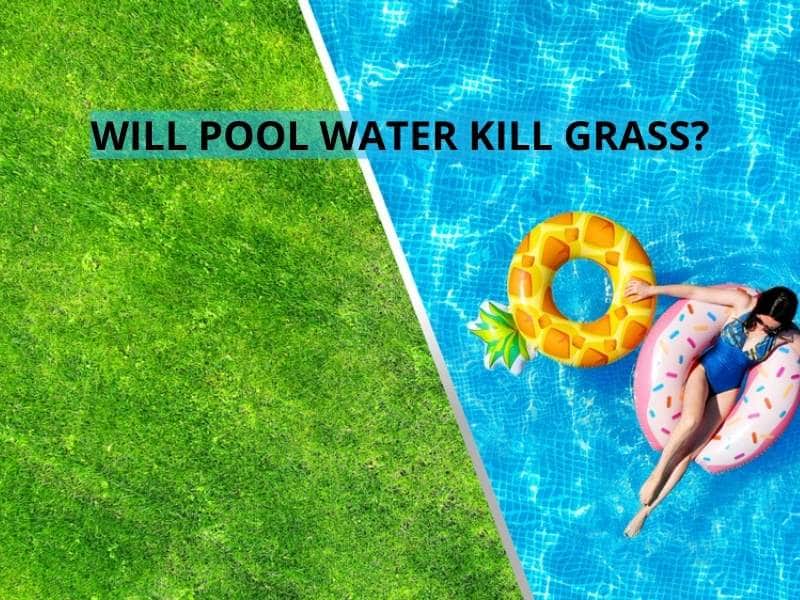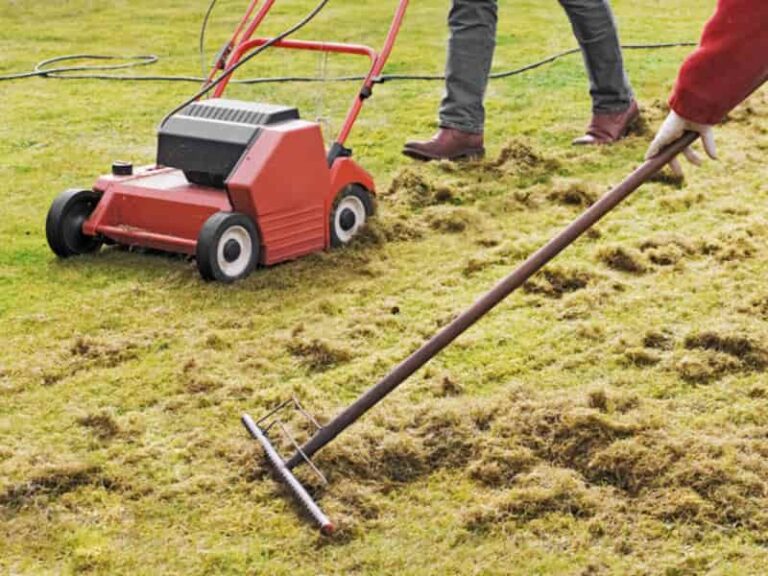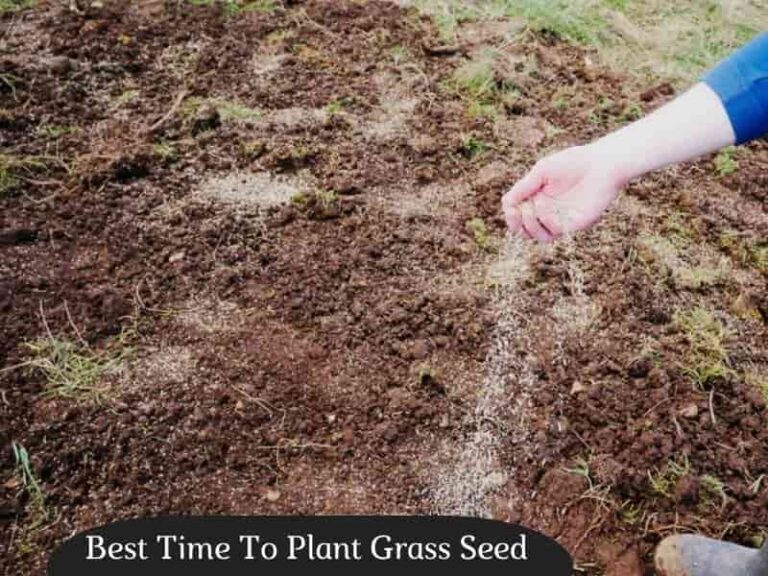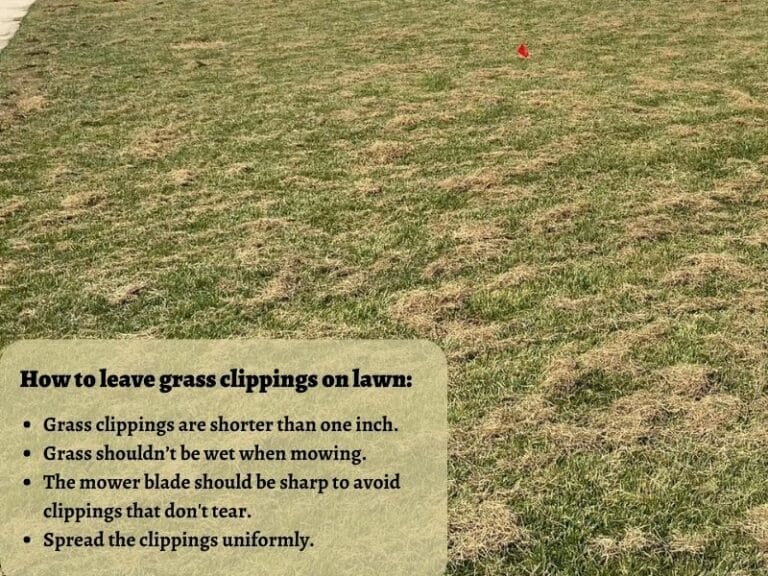Does Pool Water Kill Grass? Reasons Not to Drain Pool Water on Lawn
You may want to get rid of the uncomfortable underfoot feeling of walking on sun-heated poolside pavers by planting grass right on the edges of your swimming pool. While it is a great idea, you want to keep in mind that pool water will spill onto the lawn and may have some side effects. But, does pool water kill grass?
Pool water does not kill grass but excess chlorine and other pool chemicals can affect your lawn especially if you drain the water onto the lawn regularly. Excess chlorine from constant splashes affects the soil pH in your lawn and can burn your turfgrass causing it to turn yellow or brown.
However, this also raises concerns over the possibility of chlorinated or salty pool water killing turfgrass. The truth, however, is that your grass will be fine so long as you don’t empty massive amounts of chlorinated/salty pool water on the lawn.
Will pool water kill grass?
Various chemicals like chlorine and algaecides are usually added to pool water to make the water safe for human use. However, with some lawns creeping right up to the edge of the pool, you might be concerned about the possibility of the water killing the grass. The possible effect, however, largely depends on the amount of pool water chemicals that end up on the lawn.
How Pool Water Chemicals Affect Your Lawn

Pool water chemistry is complicated because there are some salts, algaecides, and other chemicals that keep the water safe for humans. So, how does this water affect your turfgrass?
Chlorine in pool water
The chances of water splashes from a chlorinated pool killing your lawn grass are slim to none because the amount of chlorine contained in pool water that gets onto lawns via splashes and dripping swimming costumes is too insignificant to affect turfgrass.
Chlorine is a fast-leeching chemical that flushes quickly whenever it rains or the turf is irrigated. Keep in mind that the longer a toxic chemical sits in the soil, the higher the chances of it causing damage to plants.
If you drain your chlorinated pool water on your lawn, the grass will suffer damage because despite the chlorine being diluted, the amount of chlorine in the water could be enough to alter soil pH and kill lawn grass.
This is especially likely in large pools or those with water that’s not chemically balanced (contain too much chlorine).
Note: Before emptying chlorinated pool water onto your lawn, ensure that the chlorine content in the water doesn’t exceed 0.1 parts per million.
Salts in saltwater pools
The above point of view also holds if you have saltwater rather than a freshwater pool. Small splashes of salted pool water won’t harm your grass turf. Take note, though, that the threshold for damage is much lower for salt than it is for chlorine. Salt doesn’t leech easily and holds onto lawn soil much longer than chlorine.
As the salt builds up in the lawn over time due to splashes and drips, the amount of salt could become substantial enough to kill lawn grass. Salt hampers root growth and development, thus preventing optimal absorption of water and nutrients. As a result, the turfgrass starves and dies.
The problem is likely to be worse in clay-type soils, as the salty water increases soil compaction. As a result, the salt stays in the grass root zone even longer, and grass root development slows down as the roots are unable to find air pockets in the soil to grow through.
The only way to get rid of salt buildup from pool water on your grass is to soak up the lawn with fresh water and completely avoid draining salty pool water on your lawn, as damage to grass is almost guaranteed in such instances.
Pro tip: To prevent salt from pool water splashes from building up to dangerous levels on your lawn, ensure you water the lawn with fresh water every time you’re done using the pool.
Algaecides in pool water
Pool water containing both chlorine and algaecides is the least likely to cause damage to lawn grass. The algaecides lower the chlorine levels, making the chlorinated water even less likely to kill turfgrass.
What’s more, algaecides by themselves aren’t harmful to grass, more so when already diluted inside pool water. In fact, copper algaecides are usually diluted and applied as a moss herbicide on lawns without any damage to the turf.
Salt-Tolerant Turf Grass
In recent years, scientists have developed turfgrass cultivars with a significantly higher capacity to withstand salty soil conditions. These types of turfgrasses have been bred and developed with saltwater pools in mind, with some also being able to recover relatively fast from saltwater damage.
A good example of grass that tolerates salt is Sir Walter DNA-Certified Buffalo Turfgrass.
Safe Ways to Dispose Chlorinated Pool Water
Chlorinated pool water not only holds the potential to kill turfgrass, but may also kill aquatic life if the water finds its way into water bodies. As such, you need to dispose of chlorinated pool water safely and responsibly; either by discharging it to a sanitary sewer or dechlorinating before draining the water on your lawn.
Discharge it to the sanitary sewer
The best and safest way to dispose of chlorinated pool water is to discharge it to a sanitary sewer. That’s because the water will be channeled to a treatment plant where pollutants like chlorine will be removed before it’s released into water bodies.
Before releasing chlorinated pool water into the sanitary sewer, you should seek authorization from your regional wastewater service company. Once approved, connect to the sewer system using a pump and a hose to effectively drain the pool.
If you don’t know how to properly connect the pool drainage system to the sanitary sewer system, hire a professional plumber. The costs will be significantly lower than the fines you’ll be charged in case your chlorinated pool water ends up in the municipal stormwater system due to an incorrect connection.
Irrigate safely
If your area wastewater service provider doesn’t permit the discharge of chlorinated pool water into the sanitary sewer, the next best option is to safely and responsibly dispose of the water on your lawn or on the ground.
Here are the safety considerations when emptying chlorinated pool water onto a lawn or on the ground:
- Shut off the chlorination system, or desist from adding more chlorine to the pool water at least a week prior. This will allow enough time for the chlorine to dissipate with the help of sunlight, and the chlorine levels to reduce to undetectable amounts.
- After the holding period elapses, test the chlorine levels of the pool water using a chlorine test kit. If the chlorine is still detectable (0.1 mg/L or more), increase the holding duration to two weeks.
- You can also reduce chlorine in pool water to undetectable levels via chemical dechlorination. You can purchase various chlorine-removing products from pool maintenance stores near you.
Once the chlorine levels in the pool water are low and undetectable, discharge the water onto your lawn, all while ensuring there’s no runoff to any nearby water sources or storm sewers.
References
- DC Government: How to Drain Your Swimming Pool Properly
- Ryan Adams, Iowa State University Extension: Chlorine Toxicity




